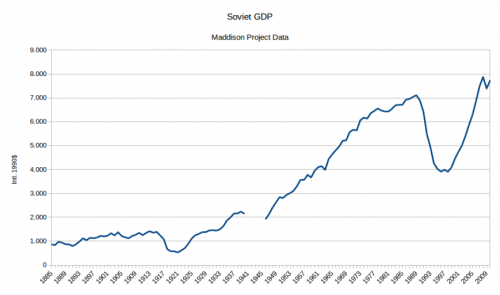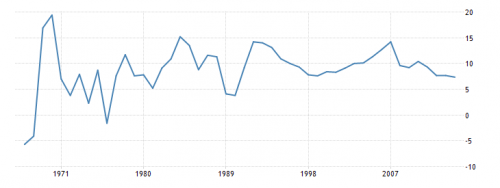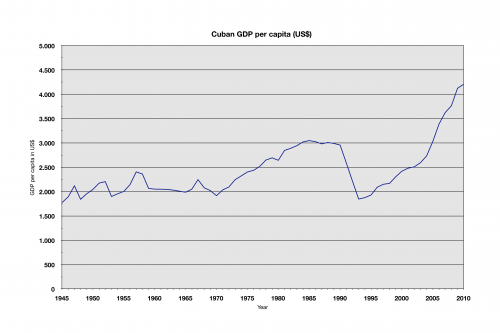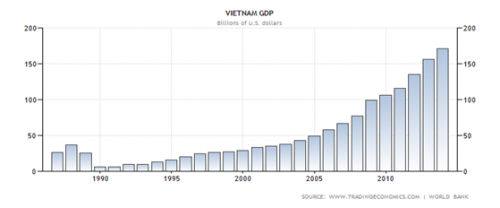Did socialism fail?
Submitted by gjohnsit on Sun, 06/12/2016 - 1:17pm

It's become common knowledge that "only capitalism works".
Their proof is because most of the communist countries "gave up".
But that was a political decision made by corrupt elites. While it does prove that the political system of communism failed, and it unquestionably did, it doesn't say anything about the economic system of socialism.
So for the purpose of adding data to the debate, here's some historic GDP graphs. These aren't meant to be the final word in this debate, but merely add to it.
Soviet Union

China GDP Y/Y





Comments
rather than GDP
it might be more fruitful to look at citizen welfare and happiness. From my view the great evil of capitalism is everything is valued as money. The other big issue is that environmental costs are considered to be zero. That said, I appreciate your research on the economics of the nation and world.
https://www.gfmag.com/global-data/non-economic-data/happiest-countries Almost all of the 10 happiest countries are socialist.
“Until justice rolls down like water and righteousness like a mighty stream.”
But can you find reliable historical numbers for that?
There are all sorts of variables here:
most of these countries were under economic embargo, and sometimes military seige
various wars, both internal and external
etc.
It's going to be hard to pin down anything.
Looks like it started in 2002
I really wasn't thinking as a statistician (I've forgotten how). Just the data for success vs failure. Recently I thought it might be worthwhile to do a real examination of Cuba vs Puerto Rico as a capitalism vs socialism thought experiment.
Here's what I quickly learned about measuring happiness:
http://www.earth.columbia.edu/articles/view/2960
And there are many approaches to it's measurement https://en.wikipedia.org/wiki/Gross_National_Happiness
I guess what I'm saying is we always value things in dollars, but the real things of value in our lives aren't really things.
Thanks again for your well researched insights.
“Until justice rolls down like water and righteousness like a mighty stream.”
Both Cuba & Puerto Rico received large inputs
of capital and commodities during the Cold War. The aid stopped for Cuba when the USSR ceased to exist. The aid for Puerto Rico stopped a few years later when those who control things in the US deemed Cuba not to be a threat.
I also would like to see a breakdown on quality of life feelings as well as material well being.
"The justness of individual land right is not justifiable to those to whom the land by right of first claim collectively belonged"
"rather than GDP"
Yeah, this is kinda' off-topic, but GDP can be worthless (and it frames the issue in their terms.)
To the men with bulldozers both building houses and destroying houses adds to income (GDP).
Selling dynamite, destroying a forest, or a stream, lots of destructive things can add to GDP.
Alternatives to the GDP About 27,000,000 results (Google search warning)
Alternatives to the GDP (PDF warning)
Socialism
in both China and the Soviet Union failed not because of the concept of socialism, but because of the capitalism that those in power exercised for their own personal gain.
This country used to practice socialism. Look at our infrastructure and social programs until the late seventies. That's when capitalism started to kick into overdrive. Downhill since.
Regardless of the path in life I chose, I realize it's always forward, never straight.
Did Socialism Fail?
Actually, the happiest countries in the world are also the most equal. Their taxes are high, top earners and lowest earners aren't that far apart, and everybody has access to the generous governmental safety net. Most are in Northern Europe, aka Scandinavia and the Netherlands, and they aren't purely socialistic either, but a blend of socialism and capitalism, a la Bernie and FDR. I recently read a little gem of a book called The Year of Living Danishly By Helen Russell, a British journalist whose husband was offered a job at Legoland in Jutland, Denmark for a year. She set about interviewing Danes from all walks of life to try to determine why they've been called the happiest people on earth. Her conclusion: knowing that your country will take care of you if you fall on hard times is enormously comforting, reduces stress levels, and allows you to feel part of something bigger than yourself. In other words, they're all in it together. I highly recommend reading the book to see how it's done successfully.
Power elites fail. You can't turn the whole thing over to those
in power, you have to have checks and balances and responsiveness. Thus the leaders try to take from each according to their ability and give to each according to their needs, and they just make everyone miserable. Or the rich try to frack until the last drop of gas is taken from the earth, and they just make everyone miserable. A combination of socialism and capitalism probably works best. Socialize things that we want for health and happiness regardless of the profit made, such as health and education and a basic income. Capitalize the things we can make do without, give talented and ambitious people opportunities to make more money.
Please check out Pet Vet Help, consider joining us to help pets, and follow me @ElenaCarlena on Twitter! Thank you.
Life always seems to be about achieving the proper balance.
and I agree with you on this one that the proper balance most likely lies in exactly that direction.
I guess that's what made me realize I was a Democratic Socialist if I had to wear a label.
"I used to vote Republican & Democrat, I also used to shit my pants. Eventually I got smart enough to stop doing both things." -Me
heh, gjohnsit, you know that capitalism is failing, no?
Just don't kid us too much ... /s
We had too many no-kidding sort of things happening today. Give us a break.
And don't get miffed at me. Enough is enough, for today.
https://www.euronews.com/live
I think you are comparing
I think you are comparing apples and oranges. The Sander's socialism allows for private ownership, communism in it's purest form is based on collective public ownership of all property and output. This campaign has been about Democratic Socialism which refers to a democratically elected, capitalist society that identifies areas of the economy that are identified, funded and run for common good by the government. It is these countries have the highest satisfaction rate by their citizens.
Confusing and comparing to Communism is counter productive.
I wasn't talking about Sanders
Never even implied it.
I was talking about actual Socialism.
Communism is the apotheosis of democracy. Its full realization.
No nation-state on earth can possibly be "communist" because it literally means the absence of the state. It also means the absence of all classes, including a ruling class of any kind.
It's the realization, over time, of complete self-rule, self-governance, full participatory democracy in action. It's what "socialism" leads to over time, theoretically.
We've also never had actual "socialism" in place anywhere in the world on a national scale. The largest case was in Spain in the 1930s, before Franco and Hitler wiped it out.
Socialism requires full democracy, including the economy, and that the people, not political parties or dictators, own the means of production. This has never happened on any national scale.
It needs to, if we humans are to survive. But it hasn't happened yet.
There is in me an anarchy and frightful disorder. Creating makes me die a thousand deaths, because it means making order, and my entire being rebels against order. But without it I would die, scattered to the winds.
-- Albert Camus
Failure is impossible
Socialism can't fail. The myth of socialist economic "failure" is dug deep in America.
If my brother and my sister in Alabama and Afghanistan and Argentina AND EVERYFUCKINGWHERE Else has food and justice and medicine and schools for their children I can never fail. None of us can ever fail. We have to keep fighting, and failure will be impossible.
Cuba is the only country on your graphs
that was subjected to 50 years of state-sponsored terrorism by a superpower (USA) which also BTW waged a boycott and embargo which has inflicted hundreds of millions of dollars in economic damage itself, not counting the actual damage by the actual terrorist attacks during that time.
I realize you're not trying to be an apologist for capitalism, but realistically it's not factoring in a lot of historical issues which go far beyond simple economics.
The battle of Stalingrad, the Nazi terror and its starvation campaign barely lasted 1000 days for the Soviet people, Cuba has faced almost 20,000 days of a similar terror campaign. Encirclement, bombings, sneak attacks, bio-terrorism. I think that might have affected an economics graph a little bit.
The fact that it didn't appear to show much of anything, it is more of a testament to the resiliency and tenacity of the Cuban people within their socialist society, facing near impossible odds of survival against non-stop attacks from imperialist war-mongering policies by all the various US administrations up until recently.
Right you are
Besides Cuba, revolutionary socialism lifted millions of people out of misery and poverty in Russia, China, and Eastern Europe. Interesting how the nations under Soviet domination during the cold war are now for the most part decent, modern societies. The nations under US control (Honduras, Haiti, El Salvador, etc) are cesspools of poverty.
when I travelled to Eastern Europe
in 2002, I had conversations in Czech Republic about life before and after the fall of the USSR.
During the communist days, before Havel and the 1990s, I was told that
for the most part in the Czech Republic, the social conditions were better. In fact, in my interview with a retired Czech worker, he said that his family home, a house with two stories, it was a built because of the communist policies then. The government financed the construction of homes, if the new owners agreed on early marriage and start a family. So, Joseph and his wife have together been for a long time in this home. But without the financial help of the government, they simply could not bear the cost of a similar home today.
Unfortunately today, the decadent influence of the United States produces many negative things for the Czech Republic people. There is more greed, more of selfish attitudes. Such relationships did not exist during the communist time. Then people were more friendly, more honest, more helpful.
Now the slogan seems to be, "First how I will get the advantage?"
or "What are you going to do for me?" Ironically, the biggest supporters
of capitalism in the Czech Republic today is often found in cadres of former ex-communists.
How can something that was never tried "fail"?
The Soviet Union never established "socialism." Not even close. It established state capitalism, as per Lenin's own directives. In order for it to have become actual socialism, the means of production would have to go to the people -- not to political parties, juntas, dictators or the lie. You'd also need full on democracy, including the economy. The economy itself would have to be of the people, by the people, for the people, not just the political system.
No nation-state has ever established socialism across the board, much less "communism," which is the absence of the state.
[video:https://www.youtube.com/watch?v=K4Tq4VE8eHQ]
Communism is basically socialism without the state apparatus. It is the natural end point for socialism, after socialism becomes second nature, a part of the woodwork, so we no longer need a state apparatus to maintain it . . . . to keep democracy going, to keep the absence of classes going, to keep a democratized economy going. Socialism heads toward this, and then, over time, we can chuck the state.
We can't fairly critique "socialism" or "communism" beyond small scale practice and theory, because they have never existed nation-wide.
There is in me an anarchy and frightful disorder. Creating makes me die a thousand deaths, because it means making order, and my entire being rebels against order. But without it I would die, scattered to the winds.
-- Albert Camus